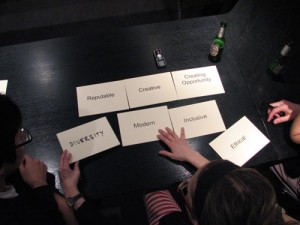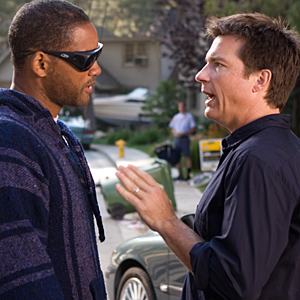Does your opinion matter? And since it doesn’t, will you like Hancock?
 As I’ve suggested in many of my reviews, Hollywood believes that the most important result from a film is a product – not necessarily entertainment, let alone art. Demonstrating this concept, a couple of recent films that were stripped down and spare to the point of absurdity, sometimes to their benefit, were The Incredible Hulk and The Strangers. The Incredible Hulk is the first superhero movie under two hours in quite some time (and yet still slow), and The Strangers is the most no-frills thriller since Panic Room, devoid of point, pleasure, aesthetic, or otherwise. But that may be an attribute for some.
As I’ve suggested in many of my reviews, Hollywood believes that the most important result from a film is a product – not necessarily entertainment, let alone art. Demonstrating this concept, a couple of recent films that were stripped down and spare to the point of absurdity, sometimes to their benefit, were The Incredible Hulk and The Strangers. The Incredible Hulk is the first superhero movie under two hours in quite some time (and yet still slow), and The Strangers is the most no-frills thriller since Panic Room, devoid of point, pleasure, aesthetic, or otherwise. But that may be an attribute for some.
So if you believe that studios care what you think about their product, you’re quite wrong. As the market segments even more, and foreign money and DVDs are where the majority of their profit comes from, studios are not thinking about how something looks, just that it makes a quick TV ad and has enough product placement in the movie itself to justify the initial production cost and make you re-purchase what you already forgot about it by the time it hits DVD. Nowhere is this more evident than in the testing process.
Now, I used to live in New York City where I attended, during a period of six or seven years, somewhere in the neighborhood of 60 or 70 movie test screenings hosted by studio consultants. These are generally months to years in advance of the eventual release date, so they are not finished films. The movies often have incomplete effects, editing, and temp music tracks (apparently there are only word of mouth screenings a few weeks in advance of release in Ohio). The fact that these were works in progress was most evident when I saw an early cut of Bridget Jones’s Diary, and recognized some music ripped from the score of… Alien. Sometimes you’re surprised when one of those unfinished films is terrific. One of those superb movies was Margaret, which I wrote about recently.
Unfortunately, I discovered that the test screenings had very little to do with what the test audiences enjoyed; rather, the producers used them as a ruse to convince the director that he knows least. The existence of the test screenings helped them appear neutral, despite how they manipulated the test audience.
 As a white male, and at that point in my early to mid-20s, I fit perfectly into the demographic the studio consultants were searching for within the test audiences. So time after time, I would be pre-selected to appear in a focus group after the screening.
As a white male, and at that point in my early to mid-20s, I fit perfectly into the demographic the studio consultants were searching for within the test audiences. So time after time, I would be pre-selected to appear in a focus group after the screening.
After the movie was over, everyone was handed a big double-sided card with an enormous amount of specific questions on it. We were also given miniature golf pencils and usually between 10 and 15 minutes to fill it out. The studio consultants will always ask more questions than needed for several reasons. First, in case people forget and leave. And second, if you don’t like the movie, they are no longer interested in what you have to say. The questions ranged from:
- Rating the movie as great, good, average, poor, or very poor;
- Writing a few sentences on what we thought of the ending;
- Rating each character from one to 10 (often the hardest part, because the character would have to be distinguishable, and the list would often be eight or nine roles deep);
- Suggestions for the title;
- Comments on particular scenes;
- And a variety of other random and inconsequential nagging thoughts.
The questions and the number of them were designed to be overwhelming and to force people to answer the easiest ones – usually ones where they could just fill in a bubble (when I would get bored, I would write notes to the producers in the margins, asking them to release what possibly interesting film they may have shelved). It made the people filling it out think their thoughts mattered and they were an important part of the process, but it’s really just a placebo for the masses and the directors.
 Studios are not really interested in your actual thoughts on the movie and what you would change if you were the editor or director. But rather, your viewpoint on the main marketable elements, such as the title, the ending, and the stars.
Studios are not really interested in your actual thoughts on the movie and what you would change if you were the editor or director. But rather, your viewpoint on the main marketable elements, such as the title, the ending, and the stars.
Nowhere is this more evident than in the focus groups that follow filling out the cards. That’s when employees of the marketing company that organized the screening for the studios ask a select few of those who have been allowed to attend (I’ve been told to skip a line of several hundred “ineligibles” because of my age, race, and the fact that I brought a date).
The focus group is a producer’s panacea of people who fit the studio’s particular stereotype of who would enjoy that film. So, the studio consultants have already used the “cards” to eliminate those outside their chosen demographic and who didn’t like the film. Why, pray tell, would they dis-invite you from the focus group? Because, they aren’t interested in fixing the movie, at least in terms of what the audience likes, just what the people who did enjoy the film liked about it, so they know exactly how to market it. This is made obvious by the choices of questions we were asked – generally more specific versions of things already asked on the cards. But now more focused on the sellable elements. The problem is, the people in the group think they have some effect on the process, other than as advertising guinea pigs, and want their voices heard and to feel validation. I would always use the opportunity to try to shout down the idiots who would say things like “I liked the movie because they shot that one scene in my neighborhood and I recognized my local supermarket in the shot a few times.”
 Deep down, I knew it was pointless. And that caused me to want to disrupt the process. Eventually, after a few of these groups in which I made fun of the movie, I was asked never to be in one of them again. My thinking, flawed and naïve as it was, was that if I made it clear that the process was disheartening and counterproductive (making you never want to sit through a test-marketed-to-death mainstream movie ever again), perhaps it would get through to the producers, who had these groups taped for later listening. It was a welcome relief when I didn’t have to do it again.
Deep down, I knew it was pointless. And that caused me to want to disrupt the process. Eventually, after a few of these groups in which I made fun of the movie, I was asked never to be in one of them again. My thinking, flawed and naïve as it was, was that if I made it clear that the process was disheartening and counterproductive (making you never want to sit through a test-marketed-to-death mainstream movie ever again), perhaps it would get through to the producers, who had these groups taped for later listening. It was a welcome relief when I didn’t have to do it again.
Some may think it is an honor and kind of cool to see a movie long before it opens (or is finished). But you’re really just a marketing number. Though if you asked the PR flacks in attendance, they’d never admit it.
The reason any of you should care is because the result is always a heavily compromised jumbled film that has had every inch of originality and individuality taken out of it. If you keep going to these types of films, they’ll keep churning them out of the factory.
 The fallacy of the test audience makes the fact that a big budget action-comedy spectacular is actually an entirely honest movie about marketing a complete surprise. If I told you this movie was Hancock, Will Smith’s new summer tentpole about a grumpy superhero who the public doesn’t much like because of his drunken sloppiness, you’d probably be surprised. As was I.
The fallacy of the test audience makes the fact that a big budget action-comedy spectacular is actually an entirely honest movie about marketing a complete surprise. If I told you this movie was Hancock, Will Smith’s new summer tentpole about a grumpy superhero who the public doesn’t much like because of his drunken sloppiness, you’d probably be surprised. As was I.
I don’t know how director Peter Berg got away with something so subversive and dark. (Maybe that’s why some of the special effects resemble the quaint ineptness of its television brother, The Greatest American Hero. The studio must have been so annoyed at the tone that they wouldn’t give him money to smooth out the CGI). But this is certainly the first e-ticket film in memory to have a public relations guy be the hero. That the trailers barely mention this character, smoothly played by the current king of sincere smarm, Jason Bateman, is either an attempt to hoodwink the potential audience or save the surprises for personal discovery.
Smith mostly scowls his way through the first half of the film, annoyed with his immortal status, cursing at the public, destroying massive amounts of city property. This is all very deceptive, because it suggests that the character arc will be about how he softens and spends the last half of the movie finding his true calling in protecting the people. That would have been the easy way out, and probably the more profitable one, as well.
 But no. Hancock is mostly about corporate branding, public image, and political correctness. And it doesn’t hide that fact at all. Certainly this is the canniest way to handle the need for product placement and their appearances in the film become like another joke. That’s not to suggest that Hancock is a laugh riot. Mostly, you will be consistently amused, and there are a few chuckles here and there (for those who are more adventurous, seek out the much funnier Big Man Japan, which deals with a very similar topic). But compared to the same concept gone wrong of a few summers ago, the dull and uncreative My Super Ex-Girlfriend, this is a tremendous achievement.
But no. Hancock is mostly about corporate branding, public image, and political correctness. And it doesn’t hide that fact at all. Certainly this is the canniest way to handle the need for product placement and their appearances in the film become like another joke. That’s not to suggest that Hancock is a laugh riot. Mostly, you will be consistently amused, and there are a few chuckles here and there (for those who are more adventurous, seek out the much funnier Big Man Japan, which deals with a very similar topic). But compared to the same concept gone wrong of a few summers ago, the dull and uncreative My Super Ex-Girlfriend, this is a tremendous achievement.



